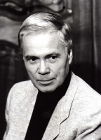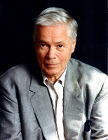ORFEO International
News
May 2012
Dietrich Fischer-Dieskau † 18 May 2012
It is no 
Dietrich Fischer-Dieskau
Foto: Archiv Orfeo International Music GmbHexaggeration to say that with the death of Dietrich Fischer-Dieskau the world has lost one of its most multitalented artists and that we are all the poorer in consequence. That he set new standards as a singer, especially in the lieder repertory, does not need restating here, and yet this was really no more than a single facet of his ultimately inexhaustible artistry. 
Dietrich Fischer-Dieskau
Foto: Archiv Orfel International Music GmbHIn the last five years alone he published books on Goethe, Brahms and Wilhelm Furtwängler, spanning a period of 150 years in German cultural history with a sovereign authority that would have done credit to the career of many a purely academic author. He was also successful as a conductor, his appearances with a whole series of world-class orchestras emphatically refuting the scepticism and prejudice that his decision to add this string to his bow may have occasioned in advance. Even in the case of such “sidelines” as teaching, painting and taking part in public readings, there was one quality in particular that was always to the fore: a lively and critical awareness of art that remained undimmed throughout the sixty or so years that Dietrich Fischer-Dieskau was active as an artist. Never for a moment was his incorruptibility diminished. True, there were experiments that did not always work out, attempts to explore areas of the repertory that remained no more than tentative. And yet it is hard, if not impossible, to think of any other singer who performed such a wide-ranging and probing selection of lieder at the Salzburg Festival and who did so, moreover, on such a consistently high artistic level. And how many singers performing the role of Wolfram von Eschenbach on Bayreuth’s Green Hill could bear comparison with every other exponent of the part, whether past or present-day, while at the same time remaining open to the new in the form of contemporary stage works such as Olivier Messiaen’s monumental Saint François d’Assise? And how few other singers recognized as clearly as he did that in order to ensure a lengthy career natural gifts grounded in a solid technique and including a striking yet soft-grained timbre needed to be constantly offset and counterbalanced by an interpretative power that continued grow as he gained in artistic experience? The epithet “exceptional” has nowadays lost much of its significance, and yet it is more than justified in the case of Dietrich Fischer-Dieskau. His passing marks the end of an era. It was – and remains – a privilege for Orfeo to have worked with him on so many projects, projects that are barely imaginable without his active involvement. Rarely has a leave-taking been so difficult in so many different ways.
Discoraphy ORFEO International
Lied
Opera
Cantatas/concert arias
Christmas
D. Fischer-Dieskau conducting
top |